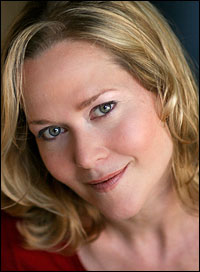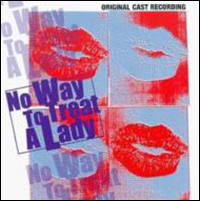
*
Rebecca Luker: I Got Love [PS Classics]
When last we spoke — in our last On the Record column, that is — I cited the 1959 Rodgers & Hart album "Barbara Cook Sings from the Heart" as one of those CDs you can listen to over and over again. And here, suddenly, comes another. "I Got Love," Rebecca Luker's new Jerome Kern album, demonstrates the perfect combination of composer and singer.
Take an early two-song track, combining the pre-Show Boat, pre-Hammerstein version of "Bill" with Show Boat's "Can't Help Lovin' That Man." How is it possible that someone in our modern-day midst can sing these early 20th-century songs so well? So clear, so true, so Kern? "I'm Old Fashioned," "Why Was I Born?": Luker sings these pure and pristine.
In the song rescue department comes "Not You," an altogether forgotten song from the altogether forgotten World War I musical Rock-A-Bye Baby. A stunning song of love unrequited; Ira and George, who in 1918 were Kern-struck youngsters, seem to have remembered this one and fashioned their own 1926 followup, "Someone to Watch Over Me." Luker does the same with another obscurity which was, at least, appreciated in its time: "And I Am All Alone" from the 1917 Have a Heart. Kern is long gone and — with the exception of Show Boat — mostly forgotten. But he has dozens of songs like this floating around on brittle old song sheets. All that's needed is for someone to find them, and someone to sing them.
The only less than enthusiastic thing we can say is that Ms. Luker — who sings like a dream — has seen fit to include a few comedy numbers (namely "Saturday Night," "My Husband's First Wife" and "I'll Be Hard to Handle"). She does these expertly, yes; but these are the functional Kern rather than the inspired Kern. After my first five hearings of the CD — yes, you'll want to listen to it repeatedly, immediately — I find myself skipping through these three. But the treasures — which is to say, just about all of the rest — are truly golden. Visit PlaybillStore.com to view theatre-related recordings for sale.
 |
||
| Rebecca Luker |
Lyrics come from Hammerstein and Wodehouse, of course, with delicious contributions from Johnny Mercer (on "I'm Old Fashioned") and Yip Harburg (on "Can't Help Singing"). There are also two special-but-little-known songs from Dorothy Fields. The bubbly "I Got Love" serves as title song of the collection, and should not be confused with the song of the same name from Purlie. The set closes with "April Fooled Me," a lovely piece which Fields pulled out of the composer's trunk a decade after his death. Maybe if we buy lots of copies of "I Got Love," Rebecca and her pals at PS Classics will take a second foray into the still treasure-laden Kern songbook.
 |
||
| Cover art |
The York Theatre, which has made it a mission to rescue unsung musicals, saw fit to revive the show in 1996. This time it was recorded, and it is that production — featuring Adam Grupper (as the cop, Moe Brummell), Paul Schoeffler (as the murderer), Marguerite MacIntyre (as the girl), and Alix Korey gagging it up as everybody else — that is now newly arrived.
Given the tongue-in-cheek nature of the score — with the murderer serenading his victims in various disguises (including a female one), and the fourth actor playing two monster mothers plus three victims — none of the songs are especially extractable. "So Far, So Good" — a charming, upbeat song — represents Mr. Cohen well. What is most delightful about the score — and most impressive — is the way the author incorporates tunes and characters into a musical tapestry.
"Front Page News" is a good example, with the four singers having different reactions to the murder story on page one. (The daffy plot, taken from a 1964 novel by William Goldman and the 1968 film version, tells of an unemployed actor whose ghostly mother — a la "Psycho" — derides him as a failure until he manages to get his name on the front page of the New York Times.) "I Need a Life," "Lunch with Sarah," "So Much in Common," "What Shall I Sing for You," all work well within the admittedly tight structure.
No Way to Treat a Lady is little-known; in researching this review, I discovered that the original production is not only excluded from the usually complete Theatre World series, it is altogether ignored by the Internet Off-Broadway Database. This rerelease will perhaps help alleviate this lapse, as Mr. Cohen is a songwriter we do not hear enough of. And in a day and age when there is a decided market for small-scale macabre chamber musicals, regional theatres and stock & amateur venues might do well to lend an ear to No Way to Treat a Lady. (Steven Suskin is author of "Show Tunes," "The Sound of Broadway Music: A Book of Orchestrators and Orchestrations," "Second Act Trouble," the "Broadway Yearbook" series and the "Opening Night on Broadway" books. He also pens Playbill.com's Book Shelf and DVD Shelf columns. He can be reached at [email protected].)
Visit PlaybillStore.com to view theatre-related recordings for sale.









